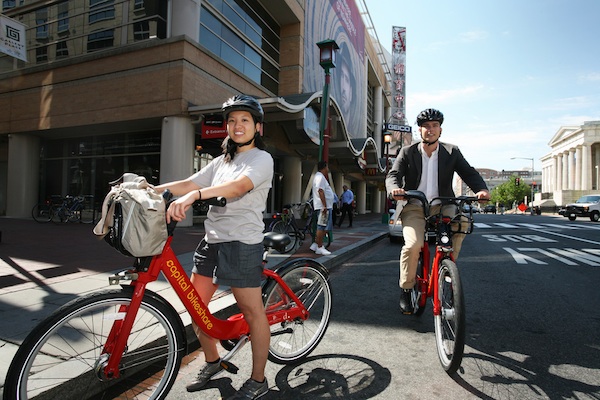A year ago this month, employees at DC’s Department of Transportation teamed up with their counterparts in Arlington to launch a new kind of regional-transit system. This one wouldn’t require building underground subway tunnels or installing new traffic lights or constructing a bridge. It wouldn’t contribute to pollution or traffic congestion, either. In fact, the new system just might make people healthier.
The idea? To work together to get people riding—and sharing—bikes.
“We agreed to have one combined bikeshare system where members could ride back and forth—and back again—between the two jurisdictions,” says BikeArlington program manager Chris Eatough. A single system for the region, planners hoped, would attract more members than separate DC- and Arlington-specific programs.
Capital Bikeshare launched last September, just four months after Eatough and BikeArlington joined forces with DDOT—record time by bureaucratic standards. At the end of its first eight months, CaBi already has nearly 12,000 annual members and averages 4,000 to 5,000 rides a day. A large portion of those members signed up only recently: In April, CaBi ran a one-day deal on LivingSocial for discounted annual and monthlong memberships, selling 8,108 in all. So far, about 5,000 of the annual memberships have been redeemed, though it’s unclear how many of those are current members who used the deal to extend existing memberships.
By contrast, DC’s pilot bikeshare program, SmartBike DC, had only 1,600 members in its heyday. That program lasted two years.
“We learned a lot from SmartBike,” says Chris Holben, DDOT’s bikesharing program manager. Its biggest limitation, he says, was size: SmartBike DC had only 10 stations and 100 bikes; Capital Bikeshare has 114 stations and 1,100 bikes—with plans to add more.
“The scale alone is going to attract more people,” says Holben.
This time around, planners also found the right partner. SmartBike was operated by Clear Channel Outdoor, the advertising company that maintains DC bus shelters. Running the bike program was part of the company’s contract with DDOT, but it wasn’t an area in which Clear Channel had a ton of experience. “We knew right from the start that we wanted to expand SmartBike, but Clear Channel was more interested in ad space than building out the program,” Holben says.
So when Arlington started reviewing proposals from vendors for its own bikesharing program last spring, Holben and his team hopped onboard. They ultimately selected Alta Bicycle Share, a Portland-based company that's helped with bikesharing programs in Australia, Europe, and China. Alta promised shareable bikes—the same ones used in Montreal's program—that would be comfortable for riders of all sizes; solar-powered, mobile bike stations that wouldn’t require a Pepco power source; options for both annual members and day riders, something that the old system didn’t allow for; and—most important—the ability to expand and adapt.
Holben says the adaptability of the new system has already proven valuable. Anticipating increased ridership during the National Cherry Blossom Festival, he doubled the size of the bike station near the USDA building at 12th Street and Independence Avenue, Southwest. It worked: The system saw a big bump in 24-hour users for the three weeks during the festival. At last count, Capital Bikeshare has served about 21,000 single-day pass riders since its launch; at $5 a person, the numbers really add up.
Holben and Eatough have plans to expand the system before the end of the year to keep up with demand, with at least 25 new stations in the works. (See a map of the planned stations here.) Alexandria has expressed interest in joining the program, too.
Because the system is expensive to maintain—it costs $35,000 to $50,000 to set up a station, plus another $1,000 a month per station for Alta-provided maintenance—planners are exploring new streams of revenue, such as advertising on bikes and stations. Holben hopes the program will be fully self-sustained—with at least 50 percent paid in member and usage fees—in two or three years.
“Each new station opens up so many more possibilities for people,” says Holben. “Once you have a station down, you increase the web of places people can go almost exponentially.”
>> Want to weigh in? DDOT is hosting a public meeting to discuss 25 proposed new bikeshare stations on Wednesday, May 25 from 6 to 8 PM at 441 Fourth Street, Northwest, Room 1107.
Subscribe to Washingtonian
Follow Well+Being on Twitter
More >> Health | Top Doctors | Well+Being Blog



















